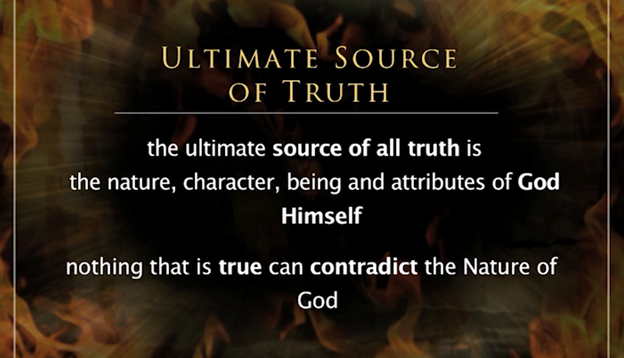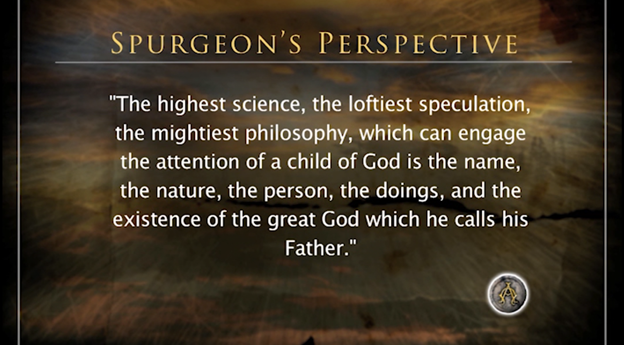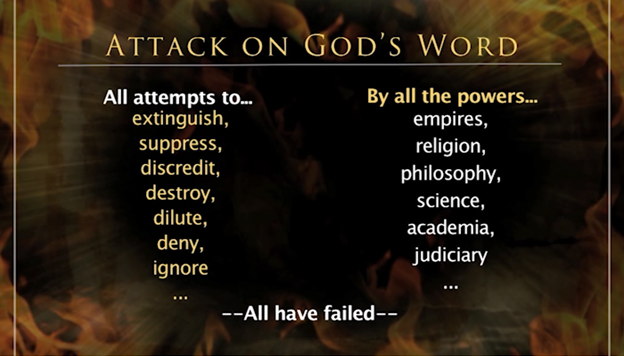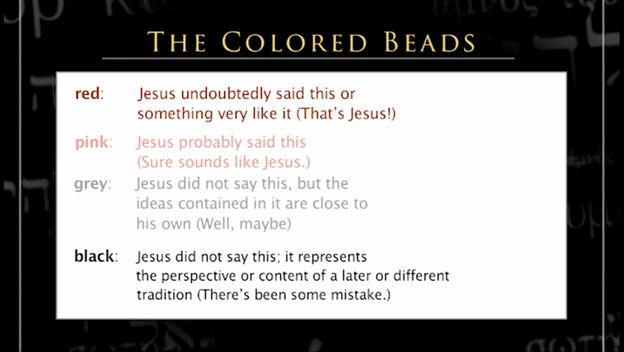This post is part 4 of a 12 part series about The Truth Project, an in-depth Christian Worldview experience led by Del Tackett and published by Focus on the Family.
In this fourth part of The Truth Project, our “tour guide” Del Tackett tackles the important subject of theology. The aim of this segment was to begin to answer the question “who is God?”. In this lesson, we are aiming to study the existence, nature, and attributes of God especially opposed to what the world will say about God.
Tackett rightly explains that God is not easy to understand. As God is infinite in his depth, infinite in his height, and inscrutable in all other dimensions (see Romans 11:33), so we have a difficult time delving into the extent of God’s nature. After all, we are finite. And yet, we can know some things about God because he has revealed knowledge about himself. He has especially shown us who he is in Christ. Paul said of Christ, “in whom are hidden all the treasures of wisdom and knowledge.” (Colossians 2:3)

Definition of God: Westminster Confession of Faith
Though it is impossible to constrain God with our human definitions, we are able to speak true things about God. In confessional history, various creeds and confessions have done just that. One such confession was the Westminster Confession of Faith, where the Puritan Divines defined God with Scriptural proofs. They wrote…
“There is but one only, living, and true God: who is infinite in being and perfection, a most pure spirit, invisible, without body, parts, or passions, immutable, immense, eternal, incomprehensible, almighty, most wise, most holy, most free, most absolute, working all things according to the counsel of His own immutable and most righteous will, for His own glory; most loving, gracious, merciful, long-suffering, abundant in goodness and truth, forgiving iniquity, transgression, and sin; the rewarder of them that diligently seek Him; and withal, most just and terrible in His judgments, hating all sin, and who will by no means clear the guilty.”
According to this Bible-based confession, God is a multi-faceted being who has chosen to reveal his character and attributes to people with both elements of love and judgment. God is both incomprehensible, yet somewhat understandable through his Word.
Baptist preacher Charles Spurgeon once wrote, “The highest science, the loftiest speculation, the mightiest philosophy, which can engage the attention of a child of God is the name, the nature, the person, the doings, and the existence of the great God which he calls his Father.” Spurgeon reminds us of the importance of studying God. No other pursuit comes close to the importance of knowing God.

What is Eternal Life?
So how does one know God? Jesus spoke most clearly about knowing God through the concept of “eternal life”. We can begin to know God through eternal life. Eternal life is more than just living forever. There are elements of knowledge in eternal life. The Gospel of John says more about it (emphasis mine)…
- “For God so loved the world, that he gave his only Son, that whoever believes in him should not perish but have eternal life.” (John 3:16)
- “Jesus said to her, ‘Everyone who drinks of this water will be thirsty again, but whoever drinks of the water that I will give him will never be thirsty again. The water that I will give him will become in him a spring of water welling up to eternal life.’” (John 4:13-14)
- “Truly, truly, I say to you, whoever hears my word and believes him who sent me has eternal life. He does not come into judgment, but has passed from death to life.” (John 5:24)
- “Do not work for the food that perishes, but for the food that endures to eternal life, which the Son of Man will give to you. For on him God the Father has set his seal.” (John 6:27)
- “Whoever feeds on my flesh and drinks my blood has eternal life, and I will raise him up on the last day.” (John 6:54)
- “When Jesus had spoken these words, he lifted up his eyes to heaven, and said, ‘Father, the hour has come; glorify your Son that the Son may glorify you, since you have given him authority over all flesh, to give eternal life to all whom you have given him. And this is eternal life, that they know you, the only true God, and Jesus Christ whom you have sent.’” (John 17:1-3)
This last passage in John 17 tells us specifically how to relate to this incomprehensible, yet somewhat understandable God through eternal life. According to Jesus, eternal life is knowing “the only true God” and his son, Jesus Christ.
God is a Jealous God
God is knowable. And God can be described through his attributes. Tackett reminds us that one of those attributes is jealousy. Jealousy arises when a connection between people is threatened. The jealous party strongly objects to intrusion of affections from another party.
Though it may seem strange to describe God as jealous, he is. God is jealous for the affections of his people. Exodus 34:34 states, “(for you shall worship no other god, for the LORD, whose name is Jealous, is a jealous God).” Jealousy is that zeal which arises when sin threatens a relationship with him. And jealousy is so tied to God’s character that he names himself “Jealous”. Because names are so tied to identities, it’s significant God chose to reveal one of his names with a seemingly unrelated aspect of jealousy. God’s affection for his people is great.
The Battle Against God’s Nature & His Word
So God is knowable and he is understood through various attributes as described in Scripture. But the dominant alternative worldview fights against God. Enter the worldview challenges against God and his revelation.
There are many challenges against biblical truth in our day. The most critical of these challenges relate to the nature of God and the trustworthiness of his Word. R.C. Sproul said that “Because if we can establish the existence of God and the trustworthiness of sacred Scripture, 90% of the work of the defence of Christianity has been solved.” If Sproul is right, then addressing these two areas is pivotal to establishing the truth of Christianity. In addition, we shouldn’t be surprised when God’s name and God’s word are attacked mercilessly by those outside the faith.
Throughout history, the world has assaulted the veracity of Scripture. These attempts to extinguish, suppress, discredit, dilute, deny, and ignore the Bible have all failed. No matter who tried to undermine the Bible including empires, false religions, philosophies, scientific establishments, academia, and the judiciary, every one eventually failed.

One such attack came from Voltaire. In 1776, the French philosopher declared, “100 years from my day there will not be a Bible in the earth except one that is looked upon by an antiquarian curiosity seeker.” Voltaire continued two years lager, “It took 12 men to start Christianity; one will destroy it.” That same year Voltaire died. In a providential twist, one hundred years after he had prophesied the end of the Bible, Voltaire’s home was used by a Bible society to distribute Scripture across Europe(source). Regardless of which attack assailed the Bible, God’s word has remained. The Apostle Peter said it best, “All flesh is like grass and all its glory like the flower of grass. The grass withers, and the flower falls, but the word of the Lord remains forever.” (1 Peter 1:24-25)
The attacks continued after Voltaire. Julius Wellhaussen, the Father of Higher Criticism, also aimed to discredit the divine inspiration of the Scriptures. He helped formulate the Documentary Hypothesis, a theory that alleged Moses was not the primary author of the Pentateuch. Instead, he claimed the first five books of the Bible were a compilation work from several groups of scholars composed over hundreds of years. Though this movement spawned Liberal theology project, the hypothesis was never confirmed through independent textual discoveries.
In the same tradition, some contemporary Bible critics aimed to discredit the four gospels. The Jesus Seminar was a collection of self-described critical scholars which cast votes on what each scholar thought Jesus in the gospels. Votes were represented by red, pink, grey, and black beads. Red meant Jesus undoubtedly said this or something very like it, pink meant Jesus probably said it, gray meant Jesus did not say it though he had similar ideas, and black meant Jesus did not say it.
The net result of this critical review of the Gospels was astounding. According to the Jesus Seminar, 82% of the words of Jesus were not actually spoken by him. Essentially, the Jesus Seminar was more like the anti-Jesus Seminar. Once again, their pronouncements completely lack early textual support. There are many reasons to doubt the assumptions, the methodology, and the findings of the pretentiously-named Jesus Seminar (source). It is yet another failed attempt to discredit the Word of God.

Application: Why the Battle Against the Bible Is So Fierce
The reason the battle is so fierce against the Bible is because it is so powerful. Satan, the one ultimately opposing the Word of God through false worldviews, knows that the Bible has the power to turn people from darkness to light. Hebrews 4:12 tells us, “For the word of God is living and active, sharper than any two-edged sword, piercing to the division of soul and of spirit, of joints and of marrow, and discerning the thoughts and intentions of the heart.”
Just as Scripture has the power to convert a sinner into a saint through the Holy Spirit, so also it has the power to enliven God’s people. We can gaze upon God’s face through his Word and be changed for the better.
Header image credit: Davide Cantelli on Unsplash.



